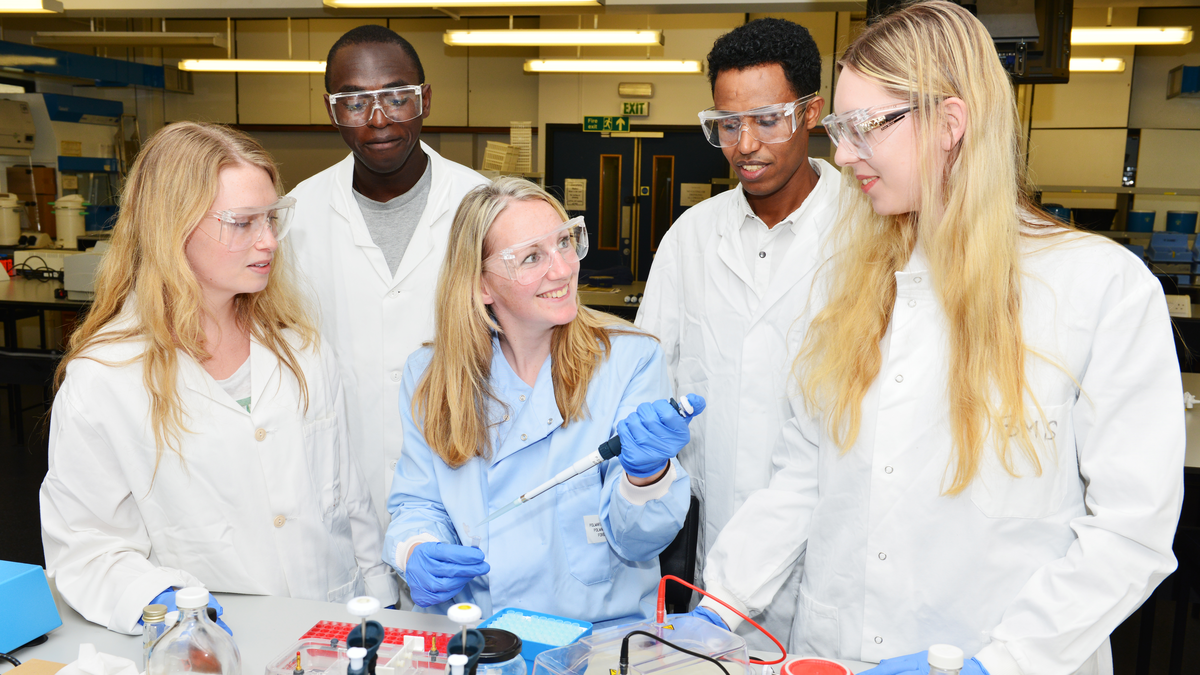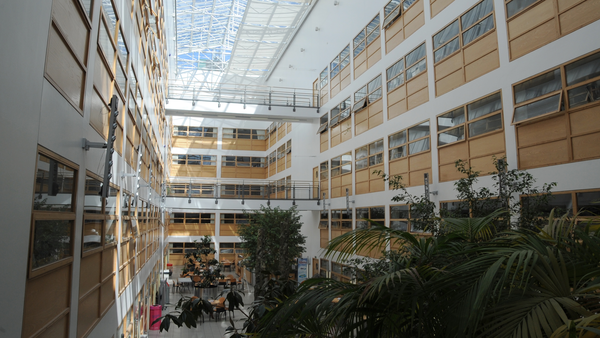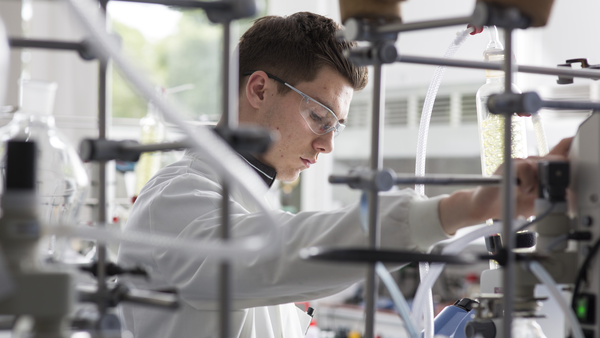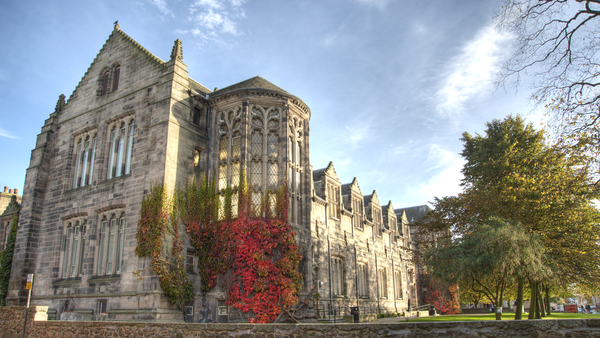Introduction
Pharmacology is about the discovery and characterisation of drugs that are used either as medicines or as experimental tools for advancing our understanding of the body in health and disease.
We are ranked 1st in the UK for Anatomy and Physiology in The Times & Sunday Times Good University Guide 2024.
Study Information
At a Glance
- Learning Mode
- On Campus Learning
- Degree Qualification
- BSc
- Duration
- 48 months
- Study Mode
- Full Time
- Start Month
- September
- UCAS Code
- B210
- Pathway Programme Available
- Undergraduate Foundation Programme

Pharmacology is concerned primarily with the characterisation of the properties and modes of action of drugs and with the discovery of new drugs. The study and practice of pharmacology also includes drug toxicity, the way drugs are used and the processes by which drugs are absorbed, distributed in the body, metabolised and excreted.
This degree programme aims to instil a broad base of knowledge about drugs at the molecular, cellular, tissue and systems level. Additionally, you will gain an in depth understanding of selected aspects of Pharmacology, which reflect the research expertise and strengths of the School e.g. neuropharmacology, cancer and toxicology. This research-led approach delivers a modern, relevant and cutting edge programme equipping graduates with the experience and skills required for success in Pharmacology (and other) careers.
5 year MSci degree
This degree offers you the opportunity to undertake a year's placement in an industrial, commercial or research environment and graduate after five years with an MSci (an undergraduate Masters degree) instead of a BSc. Find out more.
What You'll Study
A degree in Pharmacology is taught via a selection of compulsory and optional courses to enhance your learning and prepare you for a future career or further study. In each year you will take courses adding up to 120 credits. Depending on the number of compulsory and optional courses offered by your degree, you can also choose other eligible courses which fit your timetable.
- Year 1
-
In year 1 you will take courses in Medical Sciences and Chemistry for Life Sciences plus additional courses selected from science and other areas.
Compulsory Courses
- Introduction to Medical Sciences (SM1001)
-
15 Credit Points
- Topics covered in this course span medical science through the ages; from ancient civilizations to the modern day science of genomics and synthetic biology.
- Alongside lecture material, in depth practical classes will cover biomedical measurement techniques, forensic science and a research-based mini project.
- Overall, this course is a journey through some of the key milestones that underpin the discipline of medical science we see today.
- Introduction to the Science of Sport, Exercise and Health (SR1002)
-
15 Credit Points
- this course introduces core concepts of physiology, sport science and biomedical science and sets foundations for further study of these topics;
- the course uses responses and adaptations to exercise and physical challenges to integrate and highlight links between biomedical subjects like anatomy, nutrition, pharmacology or bioenergetics;
- the course uses a streamlined modular system to deliver and assess the course content and fortnightly online assessments ensure effective learning and are highly commended by students;
- each subject or practical class is delivered by specialized members of staff to ensure state-of-the-art content and delivery
- Chemistry for the Life Sciences 1 (CM1020)
-
15 Credit Points
This course covers the foundations of chemistry that underpin the life sciences at a molecular level and is suitable for students with different backgrounds including little or no previous study of chemistry. The basic concepts of quantitative chemistry will be covered, along with the different types of organic molecules, acids and bases, and the principles of kinetics and thermodynamics. The relevance of the course materials to life science is emphasised throughout.
Laboratory classes introduce important practical techniques, with experiments that reinforce and complement the taught material.
The course will allow students to continue with other chemistry courses as part of their enhanced study by providing discipline breadth.
- The Cell (SM1501)
-
15 Credit Points
• Cells are the fundamental unit of life – without them life could not exist, and as such understanding how they function is crucial to our understanding of biology and medical science.• This course provides theoretical knowledge in a diverse range of topics covering the fascinating world of cells, from molecules like DNA, to how different cell types function within our bodies.• All practical classes are research based and will provide theoretical knowledge and skills training in many areas of molecular and cell biology.• Employability skills will also be explored through a highly interactive enterprise session and our online mini course.
- Chemistry for the Life Sciences 2 (CM1512)
-
15 Credit Points
Chemistry plays a vital role in the life sciences, explaining the properties of biomolecules and how biological processes work at a molecular level. Organic reaction mechanisms give insight into how different types of molecules can be synthesised and methods of chemical analysis introduce other important topics linking the chemical and life sciences. The relationship between energy, entropy and equilibrium in driving reactions will be covered and the course concludes with a survey of the molecules of life – proteins, enzymes and sugars.
Laboratory classes complement lectures by consolidating learning and developing problem-solving and hands-on practical skills.
- Getting Started at the University of Aberdeen (PD1002)
-
This course, which is prescribed for level 1 undergraduate students (and articulating students who are in their first year at the University), is studied entirely online, takes approximately 5-6 hours to complete and can be taken in one sitting, or spread across a number of weeks.
Topics include orientation overview, equality and diversity, health, safety and cyber security and how to make the most of your time at university in relation to careers and employability.
Successful completion of this course will be recorded on your Enhanced Transcript as ‘Achieved’.
Optional Courses
Select a further 45 credit points from courses of choice.
- Year 2
-
In year 2, courses cover Human Physiology. Parallel recommended courses include Biochemistry, Molecular Biology and Chemistry combined with courses delivering key skills applicable to Pharmacology.
Compulsory Courses
- Physiology of Human Cells (BI20B2)
-
15 Credit Points
- Physiology is the science of understanding life. It allows you to explore and understand why your body does what it does and how it does it;
- This introductory physiology course explores living processes at the level of cells and molecules;
- The course lays down many of the fundamental concepts of physiology required to appreciate advanced study of many of the medical science disciplines;
- You will gain practical experience and understanding of electrophysiological techniques required for the study of electrically excitable tissues, like nerves and muscle;
- You will also gain valuable experience in the key skill of writing formal scientific reports
- Molecular Biology of the Gene (BI20M3)
-
15 Credit Points
- this course will provide a comprehensive understanding of how genetic information is stored, how it is accessed by the cell to form functional proteins and how the release of this information is controlled to produce a healthy human child;
- understanding this process is essential to understanding the basis of human disease and the course will examine how genetic differences affect disease susceptibility;
- this popular, comprehensive and cutting edge course will equip students with the essential knowledge, skills and confidence in molecular biology required to progress on all courses undertaken in the School of Medical Sciences
- Foundation Skills for Medical Sciences (SM2001)
-
15 Credit Points
- this course is the cornerstone to all the advanced science courses in later years and provides you with key skills for success in science;
- feedback from employers drove the course design to give specific and focused science skills to enhance your employability;
- numerical, analytical, data interpretation, experimental design and problem solving skills are core elements that are essential for any graduate career portfolio;
- this course and the additional specifically developed online resources have been commended by employers and students alike.
- Physiology of Human Organ Systems (BI25B2)
-
15 Credit Points
-
The Physiology of Human Organ Systems course aims to develop and integrated understanding of human organ structure and function through:
• innovative teaching approaches covering the digestive, cardiovascular, respiratory, renal and reproductive systems
• participation in practical classes where students act as subjects and investigators. These will reinforce lecture material, develop scientific acumen and build team working skills
• focussed and interactive problem solving sessions applying knowledge to clinical scenarios, and developing fundamental skills critically required in the final years of the degree;
• informal teaching sessions where one-to-one staff-student interactions encourage discussion in a non-threatening environment
-
- Energy for Life (BI25M7)
-
15 Credit Points
- understanding the fundamental workings of cells is important to a wide range of scientific disciplines;
- this course integrates the key metabolic and biochemical processes that underpin human, animal and plant life in relation to health and disease;
- this core knowledge prepares you for more advanced study in all areas of life sciences and has wide ranging applications;
- you will also participate in an award winning practical series focussed on drug discovery which will build essential employability skills in experimental design, data analysis and practical laboratory skills
- Research Skills for Medical Sciences (SM2501)
-
15 Credit Points
- this course cultivates literature research skills, building confidence in team-working and communication through scientific writing and seminar presentation;
- it encourages student-led learning and organisation in researching a topic on human health or disease of your own choice, with tutors providing guidance;
- you will learn to use online and library resources to search for information from primary research articles and relay that information in the form of a written report and a Powerpoint presentation to peers and academic tutors;
- these are all fundamental skills for scientific researchers, but are also transferrable talents for many other career pathways
Optional Courses
Select a further 30 credit points from courses of choice.
- Year 3
-
In year 3 courses give you a broad introduction to pharmacology. Laboratory work is carried out largely in groups and provides extensive experience of computer-based techniques for acquisition, manipulation and presentation of scientific material.
Compulsory Courses
- Biochemical Pharmacology and Toxicology (PA3004)
-
30 Credit Points
- Biochemical pharmacology and toxicology is a broad ranging course covering many fundamental aspects of pharmacology. It lays appropriate foundations upon which advanced Pharmacological understanding is developed.
- Key aspects are: - critical concepts of pharmacological and toxicological relevance are covered in-depth at a molecular and biochemical level, with the ultimate significance to the human organism also studied- a modern and relevant practical thread (partly funded by the British Pharmacological Society) permits application of lecture materials, and enhances employability through development of relevant core practical skills- research-led special topics are also embedded where the materials studied are put in context through teaching driven by recent medical research discoveries
- Cardiovascular Physiology and Pharmacology (BM3501)
-
15 Credit Points
- cardiovascular disease is the leading cause of death worldwide. Using teaching informed by high-quality research this course provides a comprehensive understanding of cardiovascular physiology and pathophysiology;
- you will learn how the knowledge of physiological processes is directed into identifying drugs targets for disease, which will improve your understanding of drug discovery;
- insight into the molecular and cellular action of drugs in the cardiovascular system will prepare you for your final year research project;
- wider transferable skills include problem solving, data interpretation and training in the ethical and safety aspects of recruiting human subjects in research.
- Neuroscience and Neuropharmacology (BM3502)
-
15 Credit Points
- during this course, you will start to appreciate why the diagnosis and treatment of various neurological and psychiatric disorders is both an art and a science;
- students will use real-life examples from case studies to help develop and demonstrate their knowledge and understanding;
- practical classes will enhance students understanding of why developing new neuropharmaceuticals is challenging and will improve their laboratory and analytical skills;
- this course will help students understand why multidisciplinary teams are essential in improving our understanding and treatment of neurological and psychological disorders;
- this course will improve your problem-solving, scientific writing, practical and data handling skills
- Mechanisms of Disease and Principles of Chemotherapy (PA3802)
-
15 Credit Points
The course is designed to give the students a basic understanding of the mechanisms of disease.
- by understanding the process of a disease we can find ways of both treating it and/or preventing it;
- this course uses the examples of cancer, infectious disease and inflammatory disease to illustrate this;
- the factors leading to or causing the disease will be described;
- using this knowledge the way in which the drugs used to treat the disease work will be discussed;
- problems that arise from drug treatment such as drug resistance will also be covered
- Neuroscience Research Topics (BM3804)
-
15 Credit Points
- the course outlines structural and functional alterations occurring in neuronal tissue during development, in the adult and in disease states;
- the course aims to identify and explain the mechanisms underlying these events and to provide an understanding of their functional consequences by building on the expertise of neuroscience researchers;
- you will gain cutting edge, in depth knowledge of nervous system development, function and the pathology of specific disease states affecting the nervous system;
- wider transferrable skills will be gained, such as scientific writing, problem solving, and practical assessment of nervous system function, thus developing graduate attributes and skills for employability
- Frontiers of Biomedical Sciences (SM3002)
-
30 Credit Points
- this course covers many of the core concepts which form the foundations for advanced study in Biomedical and related sciences;
- you will gain cutting edge, in-depth and focussed knowledge of cell function and cell signalling delivered in a research-driven environment in preparation for advanced study of similar material in the honours year;
- you will research a topic of choice and prepare a scientific review in a similar fashion to academic staff;
- problem solving exercises designed to illustrate the application of your knowledge in the wider world and advanced laboratory techniques are interwoven strands aimed at developing graduate attributes and employability
Optional Courses
Select a further 30 credit points from courses of choice.
- Year 4
-
The Honours year aims to explore in depth, specific aspects of pharmacology. An important feature is the ten-week research project, carried out in research laboratories at the University or in local research institutes.
Compulsory Courses
- Advanced Molecules, Membranes and Cells (BM4004)
-
30 Credit Points
- the core professional knowledge you need, to be able to contribute to research-level biomedical science, especially in fields of pharmacology and physiology;
- active research scientists explain the latest developments in our understanding of brain function in health and disease, hormone and steroid signalling systems, epithelial biology and cellular homeostasis;
- small group practical classes in working laboratories introduce core research and data analysis techniques;
- research scientists present in depth material on core research techniques – transgenic animals, genome editing, biological imaging, patch clamp analysis and omic technologies
- Molecular Pharmacology (PA4005)
-
15 Credit Points
- this course provides topical reviews of receptor diversity, expression and signalling in the contexts of both basic science and applications in the treatments of disease and ill health;
- modern and developing aspects of pharmacology are linked with proteomics/ genomics, therapeutics and methods of drug discovery;
- specialist emerging aspects of molecular pharmacology including biased ligands and receptor trafficking and their role in disease will be studied in detail;
- in addition to lectures the course includes advanced data analysis-based tutorials and data presentation which will enhance transferable skills and add to graduate portfolios
- Current Topics in Pharmacological Research (PA4303)
-
15 Credit Points
The course aims to develop an understanding of pharmacological targeting and molecular toxicology at an advanced level. The learning outcomes are:
- To gain knowledge of drug-induced toxicity including organ specific toxicity, oxidative stress and the role of drug transport
- To develop advanced understandings of the processes surrounding pharmacological drug design and molecular targeting using specific examples
- To develop knowledge of the processes involved in cell death including apoptosis, autophagy and necrosis
- To enhance understanding of the use of biomarkers in pharmacology and toxicology
- To develop advanced knowledge of molecular carcinogensis (genotoxic and non-genotoxic)
- Medical Science Data Analysis Paper (SM4901)
-
Data Analysis examination paper exclusively for students taking Medical Science degree programmes.
- Medical Science General Essay Paper (SM4902)
-
General Essay examination paper exclusively for students taking Medical Science degree programmes.
- Medical Sciences Honours Research Project (SM4501)
-
60 Credit Points
- Final year Honours project offers an excellent opportunity to carry out cutting-edge literature or lab-based scientific research.
- With projects from disciplines throughout the School of Medicine, Medical Science and Nutrition to choose from, this is an opening to follow your interests working with staff and leading researchers.
- The project forms the zenith of your degree and fosters development of the skills and knowledge gained throughout your degree, as well as heightening analytical and critical thinking abilities.
- The opportunity to be part of a novel, yet-to-be published research project can be career-defining and provides experience to prepare you for the future.
We will endeavour to make all course options available; however, these may be subject to timetabling and other constraints. Please see our InfoHub pages for further information.
How You'll Study
You will be taught using a variety of methods and styles and we continually seek to make the teaching engaging, exciting and responsive to the latest research in your subject area. The research we carry out in the School directly informs and guides our teaching, particularly in the final Honours year. Our commitment to teaching is recognised by the range of University of Aberdeen Student-led Teaching Awards given to staff from our School.
As a student, your learning is supported by MyAberdeen, our virtual learning environment from which you can access the lecture Powerpoint slides, online practice tests, links to related reading, and tutorial support material.
We make innovative use of 'educational voting' handsets in class, remote control 'clickers' that allow each and every student to electronically respond in class by anonymous vote to questions posed by the lecturer.
Your academic development is supported from year 1 through to year 4 by an assigned personal tutor, who acts as adviser and mentor throughout your University career.
Learning Methods
- Lab Work
- Lectures
- Seminars
- Tutorials
- Workshops
Assessment Methods
Students are assessed by any combination of three assessment methods:
- coursework such as essays and reports completed throughout the course;
- practical assessments of the skills and competencies learnt on the course; and
- written examinations at the end of each course.
The exact mix of these methods differs between subject areas, year of study and individual courses.
Honours projects are typically assessed on the basis of a written dissertation.
Why Study Pharmacology?
- You will receive cutting edge, applicable training and practical experience in classical pharmacology, toxicology and cell and molecular pharmacology.
- The people involved in your teaching are at the forefront of pharmacology research and some may also be involved with successful spin-out companies.
- Pharmacologists at the University of Aberdeen have been involved in fundamental scientific discoveries such as morphine-like and cannabis-like substances in the brain.
- The University has been recognised by the British Pharmacological Society as a site of special scientific interest based on its achievements in pharmacology.
- You will receive training in both specialist and employment-related skills.
- The University is one of the top 10 UK Universities for spin-out company formation.
- Award winning research on opioids and cannabinoids was carried out by world-renowned Professors Kosterlitz and Pertwee at the University.
Entry Requirements
Qualifications
The information below is provided as a guide only and does not guarantee entry to the University of Aberdeen.
General Entry Requirements
- 2024 Entry
-
SQA Highers
Standard: AABB*
Applicants who have achieved AABB (or better), are encouraged to apply and will be considered. Good performance in additional Highers/ Advanced Highers may be required.
Minimum: BBB*
Applicants who have achieved BBB (or are on course to achieve this by the end of S5) are encouraged to apply and will be considered. Good performance in additional Highers/Advanced Highers will normally be required.
Adjusted: BB*
Applicants who have achieved BB, and who meet one of the widening access criteria are are guaranteed a conditional offer. Good performance in additional Highers/Advanced Highers will be required.
* Including good performance in at least two Mathematics/ Science subjects by the end of your senior phase of education.
More information on our definition of Standard, Minimum and Adjusted entry qualifications.
A LEVELS
Standard: BBB*
Minimum: BBC*
Adjusted: CCC*
* Including good performance in at least two Mathematics/ Science subjects by the end of your senior phase of education.
More information on our definition of Standard, Minimum and Adjusted entry qualifications.
International Baccalaureate
32 points, including 5, 5, 5 at HL, with two Mathematics/ Science subjects at HL.
Irish Leaving Certificate
5H with 3 at H2 AND 2 at H3 including a minimum of H3 from two Science or Mathematics subjects.
Entry from College
Advanced entry to this degree may be possible from some HNC/HND qualifications, please see www.abdn.ac.uk/study/articulation for more details.
- 2025 Entry
-
SQA Highers
Standard: BBBB*
Applicants who have achieved BBBB (or better), are encouraged to apply and will be considered. Good performance in additional Highers/ Advanced Highers may be required.
Minimum: BBB*
Applicants who have achieved BBB (or are on course to achieve this by the end of S5) are encouraged to apply and will be considered. Good performance in additional Highers/Advanced Highers will normally be required.
Adjusted: BB*
Applicants who have achieved BB, and who meet one of the widening access criteria are are guaranteed a conditional offer. Good performance in additional Highers/Advanced Highers will be required.
Foundation Apprenticeship: One FA is equivalent to a Higher at A. It cannot replace any required subjects.
* Including good performance in at least two Mathematics/ Science subjects by the end of your senior phase of education.
More information on our definition of Standard, Minimum and Adjusted entry qualifications.
A LEVELS
Standard: BBC*
Minimum: BCC*
Adjusted: CCC*
* Including good performance in at least two Mathematics/ Science subjects by the end of your senior phase of education.
More information on our definition of Standard, Minimum and Adjusted entry qualifications.
International Baccalaureate
32 points, including 5, 5, 5 at HL, with two Mathematics/ Science subjects at HL.
Irish Leaving Certificate
5H with 3 at H2 AND 2 at H3 including a minimum of H3 from two Science or Mathematics subjects.
Entry from College
Advanced entry to this degree may be possible from some HNC/HND qualifications, please see www.abdn.ac.uk/study/articulation for more details.
The information displayed in this section shows a shortened summary of our entry requirements. For more information, or for full entry requirements for Sciences degrees, see our detailed entry requirements section.
English Language Requirements
To study for an Undergraduate degree at the University of Aberdeen it is essential that you can speak, understand, read, and write English fluently. The minimum requirements for this degree are as follows:
IELTS Academic:
OVERALL - 6.0 with: Listening - 5.5; Reading - 5.5; Speaking - 5.5; Writing - 6.0
TOEFL iBT:
OVERALL - 78 with: Listening - 17; Reading - 18; Speaking - 20; Writing - 21
PTE Academic:
OVERALL - 59 with: Listening - 59; Reading - 59; Speaking - 59; Writing - 59
Cambridge English B2 First, C1 Advanced or C2 Proficiency:
OVERALL - 169 with: Listening - 162; Reading - 162; Speaking - 162; Writing - 169
Read more about specific English Language requirements here.
International Applicants
International Applicants who do not meet the Entry Requirements
The University of Aberdeen International Study Centre offers preparation programmes for international students who do not meet the direct entry requirements for undergraduate study. Discover your foundation pathway here.
Fees and Funding
You will be classified as one of the fee categories below.
| Fee category | Cost |
|---|---|
| RUK | £9,250 |
| Tuition Fees for 2024/25 Academic Year | |
| EU / International students | £24,800 |
| Tuition Fees for 2024/25 Academic Year | |
| Home Students | £1,820 |
| Tuition Fees for 2024/25 Academic Year |
Scholarships and Funding
Students from England, Wales and Northern Ireland, who pay tuition fees may be eligible for specific scholarships allowing them to receive additional funding. These are designed to provide assistance to help students support themselves during their time at Aberdeen.
International Applicants
Further Information about tuition fees and the cost of living in Aberdeen
Additional Fees
- In exceptional circumstances there may be additional fees associated with specialist courses, for example field trips. Any additional fees for a course can be found in our Catalogue of Courses.
- For more information about tuition fees for this programme, including payment plans and our refund policy, please visit our InfoHub Tuition Fees page.
Our Funding Database
View all funding options in our Funding Database.
Careers
The degree offers good prospects for research careers in academia, industry, the scientific civil service and hospitals. It can be used as an entry qualification for certain postgraduate courses, including MSc Clinical Pharmacology, Toxicology, Endocrinology, Nutrition or IT. Alternatively, it may lead on to careers such as marketing, publishing or teaching.
The degree focusses on developing detailed understanding of all aspects drugs and bioactive substances from discovery through to clinical use, and therefore provides a strong underpinning for many careers including Pharmacy. However, as Pharmacy is a patient-centred regulated health profession, substantial further study is required to account for these aspects which are outside the scope of the Pharmacology degree programme.
Our degree programmes are built to enhance your employability and three flagship options give our degrees a distinctively different flavour from many others. All our degrees offer:
- A 10-week full time research project in the final year which will provide you with valuable experience of working in a medical science research environment
- The option of an industrial placement year and graduation with an undergraduate MSci
- Highly relevant and sought after experience in bio-business aimed at giving you an understanding of the commercialisation of scientific ideas and an opportunity to learn about the biotechnology and pharmaceutical industries
Industry Links
The many Pharmacology-linked spin-out companies from the University in the last 15 years mean that links with these remain that can help with experience, placement and project prospects for proactive students. The academics involved with these commercial ventures also continue to feed into the teaching and this provides a unique dimension to the teaching team experience.
Our Experts
- Other Experts
- Dr James Hislop
- Professor Roger Pertwee
- Dr Fiona Murray
- Dr Derek Scott
- Programme Coordinator
- Professor Steve Tucker
Information About Staff Changes
You will be taught by a range of experts including professors, lecturers, teaching fellows and postgraduate tutors. Staff changes will occur from time to time; please see our InfoHub pages for further information.
Facilities

The Institute of Medical Sciences
Focused on developing future effective therapies, the Institute of Medical Sciences houses nearly 400 researchers and support staff working on cutting-edge biomedical subjects aimed at understanding the human body's response to infection and disease.

Library facilities
A dedicated Medical Library on the Foresterhill Health Campus and the fantastic facilities in the Sir Duncan Rice Library at King’s College, are complemented by online access to the key medical and health sciences journals and textbooks.

Science Teaching Hub
Our state-of-the-art Science Teaching Hub provides students with a digitally focussed environment including advanced analytical tools, research-grade equipment and flexible laboratory spaces.
Find out moreDiscover Uni
Discover Uni draws together comparable information in areas students have identified as important in making decisions about what and where to study. You can compare these and other data for different degree programmes in which you are interested.
Get in Touch
Contact Details
- Address
-
Student Recruitment & Admissions
University of Aberdeen
University Office
Regent Walk
Aberdeen
AB24 3FX


